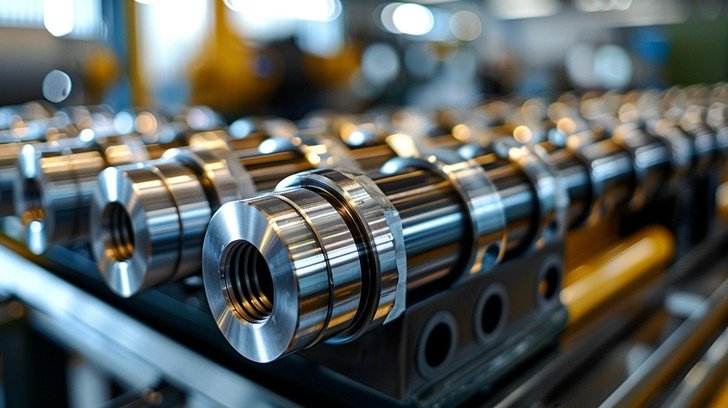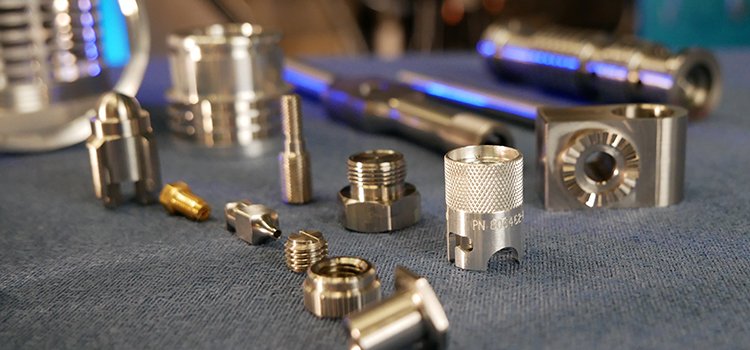In this article, we’ll explore seven key reasons why aluminum is one of the top choices for CNC machined parts. From its cost-effectiveness and excellent machinability that help keep your project within budget, to its superior material properties that meet the specific requirements of your parts, we’ll cover everything you need to know.
1. No time to wait for machining
Aluminum is a favorite for CNC machining due to its excellent machinability. Its dimensional stability allows for extensive material removal without causing significant residual stress. For a polished finish, carbide tooling combined with modern coolants ensures smooth cuts. If you prefer a matte look, sandblasting can be applied. For a consistent aesthetic appearance and enhanced corrosion resistance, anodizing is the ideal option.
The best part? This machinability helps keep production costs low. However, the choice of material should always align with the specific properties you need for your part. Below are the key characteristics that make aluminum a top choice.
2. Great strength to weight ratio
Aluminum is an excellent choice when weight reduction is a priority, as it is significantly lighter than most metals. Although pure aluminum has a relatively low tensile strength (under 100 MPa), its properties can be greatly enhanced through the following methods:
- Alloying: By mixing aluminum with other elements, its grain structure improves, resulting in higher strength.
- Heat Treatment: Heating and controlled cooling create optimally sized crystals that enhance the material\’s hardness.
- Strain Hardening: Deforming the material strengthens it by increasing dislocation movements within the crystal structure.
Compared to materials like stainless steel 316L, most aluminum alloys offer a higher strength-to-weight ratio (specific strength). While titanium has the highest specific strength, aluminum alloys provide an excellent cost-effective solution when both stiffness and weight savings are critical, making them a great alternative for budget-conscious projects.
3. Wide choice of alloys and material properties
Aluminum alloys offer a broad range of properties tailored for specific applications, making aluminum a versatile and adaptable base material. These alloys are categorized into nine series, each identified by a thousand series number (e.g., 6000 series). Within each series, alloys are further distinguished by specific grades. Generally, the closer the grade numbers (e.g., 5082 vs. 5083), the more similar their properties are.
Popular Aluminum Grades:
- 2024: Known as the aerospace grade, it has high fatigue strength and offers good toughness, making it suitable for structural applications. It achieves its properties through alloying with copper.
- 5083: The marine-grade aluminum, it provides excellent corrosion resistance, especially in seawater, thanks to its high magnesium content.
- 6082: A versatile general-purpose alloy, often used in aerospace. It combines good strength, ductility, and corrosion resistance, due to its mix of magnesium and silicon.
- 7075: A high-strength aerospace-grade alloy. It offers a great balance of properties for applications requiring high static load capacity. Its strength is enhanced through heat treatment, and it contains zinc, magnesium, and chromium.
These grades highlight aluminum’s flexibility across various industries, making it a preferred choice for many engineering applications.
4. High corrosion resistance
Aluminum offers excellent corrosion resistance, making it a reliable choice when protection against environmental factors is crucial. One of the key reasons for this is aluminum’s natural affinity for oxygen, which leads to the formation of a stable, protective layer of aluminum oxide on the surface.
Unlike highly reactive metals like magnesium, which oxidize rapidly, or less reactive metals like iron that form rust, aluminum\’s oxide layer is both tight and self-passivating. This means that when exposed to air, aluminum immediately develops a thin, uniform layer of oxide that seals the surface and prevents further oxidation. Even if this layer gets scratched, it self-heals, reducing the need for additional coatings or treatments and thus saving on production and maintenance costs.
For even greater corrosion resistance, aluminum can be anodized. Anodizing thickens the natural oxide layer, enhancing its durability and providing a robust, long-lasting barrier against wear and corrosion, which is especially beneficial for applications in harsh environments.
5. High conductivity
Aluminum\’s excellent thermal conductivity makes it an ideal choice for heat dissipation components like heat sinks. It effectively transfers heat away from critical parts, ensuring reliable performance in high-temperature environments.
While copper is traditionally preferred for its superior electrical conductivity, aluminum is often selected as a cost-effective alternative. Its lighter weight and lower price make it a practical option for electrical components in various industries. In fact, aluminum is frequently used in busbars, battery cables, and connectors, especially in automotive and electric vehicle (EV) applications, where weight savings and efficiency are essential.
6. Recyclable
Aluminum is one of the most sustainable metals, thanks to its exceptional recyclability. Recycling aluminum uses only 5% of the energy required to produce new aluminum from raw ore, significantly reducing environmental impact and energy costs. This efficiency is why a substantial portion of aluminum production, about 36% in the United States, comes from recycled scrap. By choosing aluminum for your projects, you not only benefit from its excellent material properties but also contribute to a more sustainable manufacturing process, lowering the carbon footprint of your products.
7. Aesthetics
To enhance the aesthetics of your aluminum machined parts, you can opt for anodizing, which offers a variety of colour options. This electrolytic passivation process not only thickens the natural oxide layer on metal surfaces but also allows for easy colour customization.
Aluminum CNC machining at TDB
Choosing the right material for your part is essential and depends on the specific characteristics you require. Aluminum is often an excellent choice due to the benefits outlined above.
At TDB Hanoi Co., Ltd., we specialize in CNC machining with aluminum, offering precision and efficiency for a wide range of applications. Our advanced CNC machines enable us to create intricate, high-quality aluminum parts with exceptional accuracy. With a focus on durability and customization, we ensure that each project meets the specific needs of our clients. Whether you\’re looking for milling, turning, or fabrication services, our team is equipped to deliver top-notch results tailored to your requirements.



